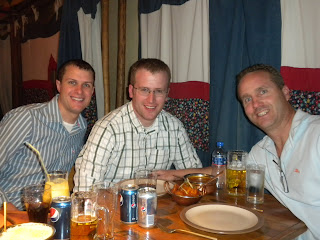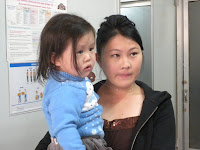Vandersteen and I have been at it now for three operative days. Each has been filled with cases morning to night with interesting and sometimes difficult operations.
The people once governed by the great Chinggis Khan have been incredible. The Mongols have these beautiful ("hoorhon" in Mongolian) children whom David and I have absolutely fallen in love with. They are very joyful children with high pain tolerance and a quiet toughness not seen in American children. The adults are warm, unassuming and accepting.
Working with David and these children has regenerated my passion for medicine. I really love kids. Sometimes I forget but they are such a joy and Vandersteen is unbelievably good with them. Even in Mongolia where he doesn’t speak a single word completely correctly, the children love him. David does medicine how we should all do medicine: no pretenses, no bitterness toward his patients, out of a desire to improve circumstances of lives otherwise pushed aside. It may sound like he is naïve, but after almost 15 years of practice, this is truly who he is as a person, doctor and friend. It’s been inspiring to work with him again. He certainly lifts my spirits and has re-sparked that fire to really help people.
We’ve done a number of transgender cases. These people often have chromosome or hormone receptor abnormalities causing severe malformation of their genitalia. These problems are really tough in any culture. However, the Mongolian families handle the issue with exceptional grace. We took care of a true hermaphrodite (which means “he” literally has male and female parts). (Pic below)
He noticed his breast starting to grow and already knew his genitalia was not right. His mother and him were so grateful for a diagnosis and for the reconstructive surgery to make him finally look like a male. Many cultures shun and humiliate transgenders, including Americans, but the Mongolians have handled it with care. The families are accepting and appreciate our efforts to make them feel "normal". The smile on this boys face the day after surgery said a thousand words and anticipated a life without torment or uncertainty.
Yesterday, David and I took on a 4 month old with probable Wilms tumor of the left kidney. It was taking up more than half of her abdomen and was visible from across the room.
We were the talk of the hospital for taking on such a large tumor in such a small child. In the US, she would certainly have gotten chemotherapy before surgery to shrink the tumor. However, for Mongols from the countryside, chemotherapy is not a reality. And, honestly, it sounds like the most appropriate chemotherapy drugs are not always available even in UB. So, David and I knew that resection may be this child's only chance at survival. She would likely be dead within weeks without surgery.
The surgery went very well and she is doing great. We had to move all the intestines, the spleen and literally peel the pancreas off the tumor. She started low on blood (anemic) and we gave blood during the operating - though there was almost no blood loss, pat on our own backs :). It is important to check if the patient's blood reacts with the blood we are transfusing, but they can't really do that here. Nori, an anesthesiologist on our team, mixed some blood samples together on the back table in a coffee saucer. Yep, a coffee saucer.
One song that has been part of my morning devotional time has been especially influential on my outlook this week:
"Other side of the world
She is just a few days old
A helpless little girl
With nothing of her own
She is not to blame
for the journey she is on
Her life is no mistake
Won't you lead her to my cross
Won't you be my voice calling
Won't you be my hands healing
Won't you be my feet walking
Into a broken world
Won't you be my chainbreaker
Won't you be my peacemaker
Won't you be my hope and joy
Won't you be my love"
-- Mercy Me
There are so many other stories to tell about traditions, food, Mongolian medicine and friends. I will try to get more of them out sooner than later. We move toward our final day of operating tomorrow. Say a prayer for all the families and children we've had the privilege of serving. I saw Kevin and Pam Block as well today. In fact, we had dinner and it was so great to see them.
If everything we do is absent of Jesus, then this so called love is in vain.
Thursday, September 15, 2011
Sunday, September 11, 2011
First day in Mongolia
So, I have finally completed a full day in Asia. I need to stop coming to these continents for work :)
Vandersteen in Customs with our surgical gear. Took 2 hours and an act of congress to get these things through congress.
Ulaanbaatar, Mongolia has been as advertised: gracious and graceful people, modern culture meets nomadic traditional Mongol life, poverty versus extravagant, crazy driving, terrible smog, and a Russian hospital. We saw over 50 patients in clinic today (can somebody say "shotgun") and documented each one in pictures.
Here are a couple beautiful kids from "countryside" with their mothers:
Most the pictures are medical (and meaningless to the none urologist) so I will spare you the enjoyment. We saw these children like a factory: they would come in, we would "hear their story" in 30-45 seconds via a translator, look at available x-rays, do a physical exam, and then triage to either surgery, no surgery, or needs surgery but we don't have time this week. After the long day, all the patients and their families were waiting in this dirty hospital to see if we would "pick" them. They were lined up in this hallway and we were passing between them - back and forth - while they watched us, hoping and praying that we would help them.
After much discussion, Vadersteen and I felt the same way: we had to help as many as we could. We put everyone of them on the schedule and turned none away. It will be an extremely busy week, but likely one the most rewarding of my young career.
Some interesting, some not interesting and some silly highlights:
View of city from our hotel.
Vandersteen and I got in a 7 mile run (or as he calls it "jog"). It was just a run. The smog and traffic make running in this city anything but fun - not to mention dangerous. But we survived, saw some monuments and got in some miles.
The "list" of surgeries broken into days for Vandersteen, Hurlee (Mongol urologist) and myself to accomplish this week:
Our operative theater and team. Note, that there are two beds in one room. Yep, we do two surgeries and two different patients in one room. Surgeon dream, but not the safest.
The whole team:
Left to right: Tomoko (anesthesiologist - Japan), Adam Childs (urology resident - Mayo, Minnesota) Yoki (anesthesia resident - Japan), me, David Vandersteen (pediatric urologist - Minneapolis, Minnesota), Keira (recovery nurse - Vancouver, BC), Jeremy Myers (urologist reconstruction/trauma specialist - Salt Lake City, Utah), Nori (pediatric anesthesiologist - Japan)
On a silly note. Vandersteen and Childs going down to visit the underground families. People literally live down in the sewer system of the city and these manhole covers are missing at times. Trouble is, at night you can literally walk right into them.
Vandersteen in Customs with our surgical gear. Took 2 hours and an act of congress to get these things through congress.
Ulaanbaatar, Mongolia has been as advertised: gracious and graceful people, modern culture meets nomadic traditional Mongol life, poverty versus extravagant, crazy driving, terrible smog, and a Russian hospital. We saw over 50 patients in clinic today (can somebody say "shotgun") and documented each one in pictures.
Here are a couple beautiful kids from "countryside" with their mothers:
Most the pictures are medical (and meaningless to the none urologist) so I will spare you the enjoyment. We saw these children like a factory: they would come in, we would "hear their story" in 30-45 seconds via a translator, look at available x-rays, do a physical exam, and then triage to either surgery, no surgery, or needs surgery but we don't have time this week. After the long day, all the patients and their families were waiting in this dirty hospital to see if we would "pick" them. They were lined up in this hallway and we were passing between them - back and forth - while they watched us, hoping and praying that we would help them.
After much discussion, Vadersteen and I felt the same way: we had to help as many as we could. We put everyone of them on the schedule and turned none away. It will be an extremely busy week, but likely one the most rewarding of my young career.
Some interesting, some not interesting and some silly highlights:
View of city from our hotel.
Vandersteen and I got in a 7 mile run (or as he calls it "jog"). It was just a run. The smog and traffic make running in this city anything but fun - not to mention dangerous. But we survived, saw some monuments and got in some miles.
The "list" of surgeries broken into days for Vandersteen, Hurlee (Mongol urologist) and myself to accomplish this week:
Our operative theater and team. Note, that there are two beds in one room. Yep, we do two surgeries and two different patients in one room. Surgeon dream, but not the safest.
The whole team:
Left to right: Tomoko (anesthesiologist - Japan), Adam Childs (urology resident - Mayo, Minnesota) Yoki (anesthesia resident - Japan), me, David Vandersteen (pediatric urologist - Minneapolis, Minnesota), Keira (recovery nurse - Vancouver, BC), Jeremy Myers (urologist reconstruction/trauma specialist - Salt Lake City, Utah), Nori (pediatric anesthesiologist - Japan)
On a silly note. Vandersteen and Childs going down to visit the underground families. People literally live down in the sewer system of the city and these manhole covers are missing at times. Trouble is, at night you can literally walk right into them.
Subscribe to:
Comments (Atom)



















